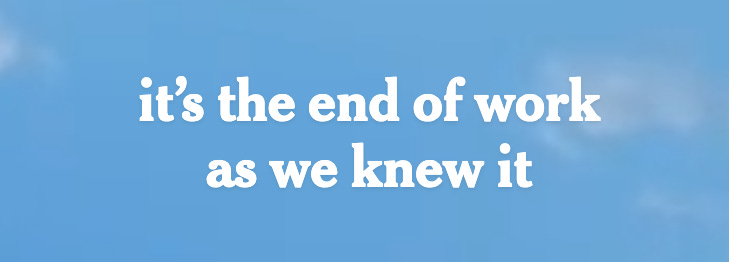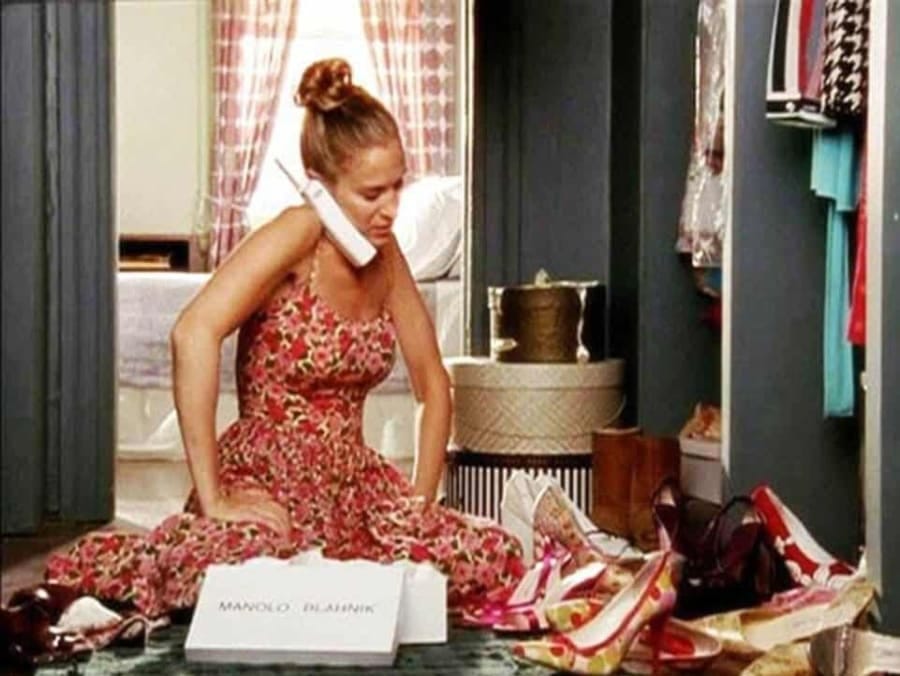Last week, Mel forwarded me a New York Times piece by Steven Kurutz, called ‘The Gen X Career Meltdown’, with the subhead: ‘Just when they should be at their peak, experienced workers in creative fields find that their skills are all but obsolete.’
That basically sums the article up.
But I’d like to add my two cents to this topic, since that’s the kind of mood I’m in and the wall I’m up against (as are many, many, many other people, Gen X to Gen Z, whether they know it yet or not).
‘Gen X-ers grew up as the younger siblings of the baby boomers,’ writes Kurutz. ‘But the media landscape of their early adult years closely resembled that of the 1950s. A tactile analog environment of landline telephones, tube TV sets, vinyl records, glossy magazines and newspapers that left ink on your hands.’
When digital technology began seeping into our lives, he says, it didn’t seem like a threat.
And it didn’t.
I was a late Gen X-er, closer to millennials than boomers, but my early childhood was still e-colours and real-world mechanics, and the crossover to digital a kind of slow, tectonic shift that came in very digestible bits and bytes in my very late teens.
When I majored in Graphics, designers were still hand-drawing page mock-ups but riding high on the super-cool future Neville Brodie was spearheading with his wild new designs using DTP, and my side-dreams of becoming a writer endlessly supported by a booming book and magazine industry.
And so, I started my career as a designer while doing what I could to muscle my way into ‘the writing world’. (University wasn’t on the cards for me, various reasons etc.)
Thirty years doesn’t feel so long, but in reality it’s many lifetimes ago; the tech switch that flipped on between 1995 to 2010 accelerated our information and commerce progress exponentially. And, sort of generally speaking, not towards great places.
While digital natives are really catching it in the face on a social level, Gen X-ers are catching it in the career.
The digital economy, AI, the creep of late-stage capitalism, ever-diminishing attention spans and tech that can do it all for a fraction of the cost and skills means that, as Kurutz points out, just as Gen X-ers enter the primes of their careers, much of their expertise have become all but obsolete, and ‘they now find themselves shut out, economically and culturally, from their chosen fields’.
Once upon a time, your basic jobbing writer (like me) could make a good income writing, copy editing, proofreading… Now? Even if there’s some small living to be scraped together it’s not a sustainable, supportive option for, say, The Rest of One’s Life.
And this change has been extremely difficult for me to come to terms with.
I’ve only ever wanted to be a writer. When I started working as one, I discovered, as a bonus, that I really love editing. Like, LOVE IT. Give me a story to fiddle with and make better and I’m over the moon. For the past twenty years, words and story are what I’ve put all my energy into doing. Nothing else interests me, nothing else compels me as totally.
But despite what well-meaning people will have you believe (I certainly believed them), you can’t eat passion. You can’t clothe yourself or house yourself with passion. You can’t travel or buy your keep-me-sane-HRT meds with passion.
So here I am, work and income dribbling away, having to make some serious decisions about what to do to make money for the rest of my life.
But I’ve not been able to.
Instead of flexing and adapting and moving fluidly to something else, I’ve been frozen by shock and despair, grief and confusion.
Instead of an easy path to ‘the next’, all I’ve seen in front of me is a big, flat, grey, apparently insurmountable wall of ‘where the fuck now?’.
Where can I go that will be safe from AI and the trajectory we’re currently on with information and communication?
Become a copywriter? That’ll be gone in a year or so. Become a project manager? Me and a million other ex-writers and editors looking for the next thing until AI takes that as well. Sell out and become an AI trainer? Not qualified enough even if I could wrap my ethics around it.
Sure, some writers are making it work; went into corporate early or started content businesses, made an effort to brand brand brand. But not this sucker. I cottoned on too freaking late that my usual laissez faire, ‘work always comes around’ approach just wasn’t going to cut it anymore.
Sigh.
So now here I am. A fucking statistic. Can you cope? Not a special little flower after all. Urgh. Yuck.
There is a world where my books find their publisher and readers and I make enough sales to support myself (a bit) through writing my little stories. There is a world where my screenplays get picked up, a world where I get oodles of clients for author coaching and developmental editing and they keep coming, one after the other, and I can charge rates that keep up with inflation and I turn people away because there aren’t five million other editors doing the same thing...
There is that world.
But it is not this world, and something has to change so that I can keep skipping along buying food and petrol and electricity. So I can travel and have massages and buy fancy face creams and get my hair did. So I can one day die in a place that is comfortable and happy.
Because, no matter what my 16-year-old self believed, I’m not the artist who is happy to suffer for their art. I don’t want to be eking out a meagre living from words for ever-diminishing returns for the rest of my life. My dreams aren’t worth the financial discomfort and unhappiness or, frankly, the horror of an unsupported old age.
So the last few weeks (months really) I’ve been staring at that wall, trying to think of what to pivot to, what to focus my attention on, what the robots can’t take and what people might want to spend money on, and, yes, what I might be vaguely interested in pursuing.
I’ve figured I’ll want something that will involve actual people, something that will involve healing and stories. Something that will benefit humans in some way.
And I’ve landed on something like a counsellor or an art therapist. I figure, since people keep fucking themselves and their kids up, I’m sure that role will still be around for a while to come. Even if the ratchet tech bros and engineers come for that, I’d like to imagine there will still be people who prefer humans to talk to.
Of course, it will be a while before this plan becomes operational, before I make the switch. I have to go back to studying and all that.
I’ll keep editing until then; keep writing my books on the side. It pleases me even if great fame and fortune don’t seem to be on the horizon for me.
But the time to think of myself as ‘a writer’ or even an editor is done, I think.
At least, I can’t keep waiting around for life to prove me wrong.
Up until this article by Kurtz, I was feeling very sorry for myself about this. Very blue. Very ashamed. Like I’d failed at something. Like I’d been naive and laughable, that my whole career as a jobbing writer was nothing more than a time-wasting wander through a dreamy dreamland.
But Kurutz’s piece went some way to remind me that there really was an industry, I wasn't imagining it. That this is not just ‘my’ problem. I have not ‘failed’. I might not have the personality to excel in the space of non-stop self-promotion, but there isn’t some mysterious magic I lack that stands between me and success because the creative industries everywhere are taking a beating and everyone is suffering. Not least of all in crumbling economies like South Africa's.
It reminded me that, right now, the system isn’t just rigged against creative pursuit, it’s rigged against humanity; against all generative, sustainable human endeavour.
So now, when I hear about young kids wanting to go into the arts, I want to shake them by the shoulders and shout: UNLESS YOU ARE INDEPENDENTLY WEALTHY OR SOMEONE WILL BE PAYING YOUR BILLS DO NOT DO THIS.*
Tom and I joke that we’re going to create a business whereby parents can hire us to convince their kids not to go into the arts without getting a degree in something worthwhile first.
Want to afford to eat in twenty years, kids? Become an engineer or plumber or electrician or builder or doctor or lawyer or accountant, and practise your arts and crafts on the side. Subscribe rather to the trope of the frustrated artist who breaks free from the confines of their cubicle to find their truth celebrated in prose and poem, pension and savings intact, rather than that of the poor artist unable to pay their bills and suffering in the name of maybe-greatness (or just averageness, really).
This isn’t the early 20th century or Hollywood’s reality, dearest.
Besides, go for the former and at least you’ll have some cash to pay for your therapy. And in a few years’ time I might even be able to help you with that! Win win.
Care for my business card?
Read the full New York Times article here.
Photo by Daniel Fatnes on Unsplash
*Listen, I don't want to harsh anyone's mellow so let me just add this footnote: Of course you could be The Next Big Thing and your art might totally roll with the zeitgeist and you will find all the agents and publishers and platforms and acclaim and money your heart could desire. It's just that it's a gamble. And all gamblers should know the parameters and risks before they roll those dice, right?











Incredible piece of writing ! And made me even more enraged with the universe that doesn’t reward your phenomenal abilities !!
God, this nailed all my feelings in one articulate swoop. Thank you, Tanya. ❤️